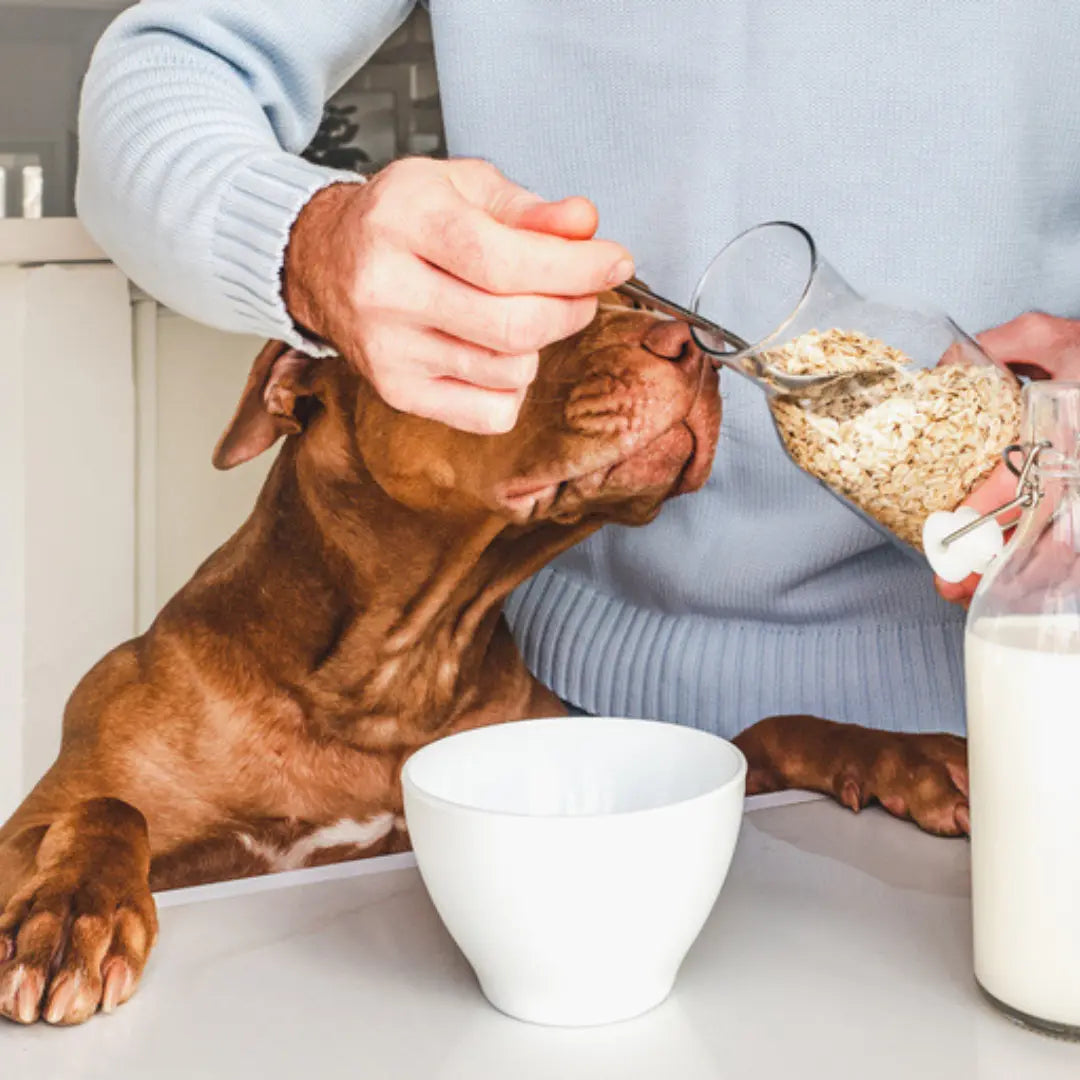Can Dogs Eat Oatmeal? Can Dogs Have Oatmeal?
As a dog parent, it's natural to want to share your food with your pup. But is it safe to offer them oatmeal? Oatmeal is undoubtedly a healthy breakfast option, but does it hold the same for your four-legged pal? The quick answer is YES, dogs can indeed eat oatmeal! But before you start giving your pup a bowl of it every morning, read this article to get to know more about it.
Is Oatmeal Good for Dogs? Is Oatmeal Healthy for Dogs?
The Nutrition Factor of Oatmeal for Dogs:
As one of our favourite human foods for breakfast, oatmeal is a carbohydrate rich in nutrients and minerals such as iron, zinc, and vitamin B, just to name a few. It is a good source of antioxidants and is high in protein compared to other grains, but it also contains essential nutrients such as linoleic acid, soluble fiber, and omega-6 fatty acids. In this blog post, we'll dive into the specific nutritional benefits of oatmeal for dogs and why it can be added to their regular diet. These essential nutrients work wonders on your dog's immune system as well as the skin as they help regenerate healthy skin cells and promote a shiny coat. Since dogs need a balanced diet, adding oatmeal to their meals can give them the required nutrition boost without compromising on the taste. However, It is always important that you monitor your dog's response. As with any dietary change, observe your dog after introducing oats to their diet. If you notice any adverse reactions, such as digestive upset or skin irritation, discontinue feeding oats and consult with your vet.
Some of the Nutritional Benefits of Oatmeal for your Dog Include:
Linoleic Acid in Oatmeal: Linoleic acid is an essential omega-6 fatty acid that is crucial for maintaining your dog's overall health. It helps to keep their coat shiny and healthy, promotes proper functioning of the immune system, and aids in muscle development and bone health. Oatmeal is a great source of linoleic acid and adding it to your dog's diet can help boost your pup’s health.
Soluble Fiber in Oatmeal: Soluble fiber is an important nutrient that can improve digestion and overall gut health. Oatmeal contains a high amount of soluble fiber, which can help regulate blood sugar and cholesterol levels and promote healthy bowel movements. It also acts as a prebiotic, promoting the growth of healthy bacteria in the gut for improved digestion. Introducing oatmeal into your dog's diet can help provide them with these essential health benefits.
Omega 6 Fatty Acids in Oatmeal: Omega-6 fatty acids play a critical role in many bodily functions, including brain development and healthy vision. They also promote healthy skin and coat, reduce inflammation, and improve joint mobility. Oatmeal contains high levels of omega-6 fatty acids, which can help keep your dog's skin healthy and reduce the risk of developing dermatitis.
Benefits of Feeding Oatmeal to Your Pup:
Apart from nutritional value, feeding oatmeal to your dog has several benefits. Oatmeal is great for its high fiber content, and by adding it to your pup's diet, you can help regulate their digestive system, bowel movements and prevent constipation. Feeding oatmeal can also keep your dog's appetite in check, keeping them fuller for more extended periods and preventing unnecessary snacking. You can make your dog anything from meals to dog treats with oatmeal.
Dog Child Organic Oats & Berries Meal Mix for Dogs
If you’re looking for a quick and nutritious way to add Oats to your dog’s diet then Dog Child’s Organic Oats & Berries Meal Mix is perfect. Filled with healthy organic oats and berries rich in antioxidants you simply rehydrate with water and mix in with your dog’s ground protein of choice - voila, you have a homemade meal for your dog. You can either use a complete and balanced meal or mix it into your dog’s regular food as a topper. Get your paws on one of our Meal Mixes today.
Organic Oats & Berries Meal Mix for Dogs

Healthy Oatmeal Recipes for Your Dog
Try out some of our healthy homemade oat-based recipes for dogs:
Oats and Berries Muffins For Dogs
Banana Peanut Butter Doggy Oatmeal
Peanut Butter Oatmeal Cookies for Dogs
Oats and Berries Lick Mat for Dogs
Beef, Sweet Potato & Oatmeal Homemade Recipe for Dogs

How to Feed Your Dog Oatmeal:
Feeding your dog oatmeal in moderation is the key to keeping them healthy and happy. When giving oatmeal to your dog, cook it plain without any sugar, salt, or added flavours. Mashed bananas and peanut butter are excellent alternatives for a little sweetness. Start by mixing a small amount of cooked oatmeal with your dog's regular food to see how they react. As you introduce oatmeal to your dog's diet, make sure it does not exceed more than 10 percent of their daily food requirements. Double check that there are no flavourings and artificial sweeteners added.
Or try our Dog Child Meal Mix to make full meals or toppers for your dog.
Which Type of Oats are Best for Dogs?
Steel-cut, old-fashioned, and quick oats are all safe for dogs. Instant oatmeal should not be fed to dogs as it contains salt and other seasonings including sugar.
When Not to Feed Your Dog Oatmeal:
Although oatmeal is a healthy diet option, it may not suit every dog. If your pup has diabetes, you should avoid feeding them oatmeal as it may raise their blood sugar level. Similarly, dogs that have grain allergies may also have a reaction to oatmeal, and it's best to avoid it altogether. Consult with your veterinarian before introducing oatmeal to your dog's diet if they have any health conditions.
Can Dogs Eat Uncooked Oats or Raw Oatmeal?
While oats are a great source of fiber for dogs, uncooked oatmeal can be tough on their digestive system. This is because dogs lack the necessary enzymes to break down the raw oats properly. As a result, your dog may experience digestive discomfort or gastrointestinal upset, such as bloating, gas, and even vomiting. Cooking oats before serving them to your pooch can help make them easier to digest and ensure your pet is able to absorb all the valuable nutrients. If your dog does consume raw oats accidentally, it will likely not cause any serious harm, but it's always best to monitor your pet for any changes in behaviour or bowel movements. So, it's best to avoid feeding your dog raw oats and opt for cooked ones instead.
Can Dogs Have Oat Milk?
The answer is yes, dogs can have oat milk in moderation. Oat milk is made from whole oat grains, which are a good source of protein, vitamins, and minerals. It's also low in fat, making it a great dairy alternative for dogs who are sensitive to lactose. Ensure the oat milk does not have any sugar or added flavourings, which can be harmful. When feeding dogs human food is essential to always read labels. It is also worth noting that oat milk should not replace your dog's regular diet of water and dog food.
For more on oats and other plant-based milks, read this article:
Can Dogs Have Almond Milk, Oat Milk, Coconut Milk or Soy Milk?
Oatmeal vs. Other Grains: Which Is Best for Your Furry Friend?"
In the world of canine nutrition, oats or oatmeal often take centre stage due to their many health benefits. However, it's important to consider other grains that could also be beneficial for your dog's diet. For instance, brown rice is another whole grain that is safe for dogs and is rich in dietary fiber, essential for a healthy digestive system. It also provides dogs with essential nutrients such as magnesium, vitamin B6, and iron.
Barley is another grain to consider, known for its high fiber content, which can help manage your dog's weight, support heart health, and regulate blood sugar levels. Quinoa, although technically a seed, is often classified as a grain and is a complete protein, providing all nine essential amino acids. However, quinoa should be introduced slowly into your dog's diet due to its high protein content.
Each of these grains offers unique benefits, and their suitability can depend on your dog's individual dietary needs and tolerances.
Introducing Oatmeal to Picky Eaters: Tips and Tricks
Start Small: Begin by offering a small amount of oatmeal mixed with their regular food. This will allow them to get accustomed to the new taste gradually.
Mix with Favourite Foods: Incorporate ingredients your dog already loves, like a spoonful of peanut butter, a few pieces of cooked chicken, or some canned dog food, into the oatmeal. This can make it more appealing.
Texture Matters: Some dogs are particular about texture. Adjust the consistency of the oatmeal to suit your dog's preferences. You can make it thicker or thinner by adding more or less water or broth.
Temperature Consideration: Dogs may prefer oatmeal served warm or at room temperature. Ensure it's not too hot to avoid burning their mouths.
Flavour Variety: Experiment with different flavours. Plain oatmeal is a blank canvas – you can add a variety of dog-friendly ingredients like fruits (e.g., mashed bananas or blueberries) or vegetables (e.g., sweet potato) to enhance taste.
Gradual Transition: If your dog remains hesitant, try mixing oatmeal into their regular food over a few days, gradually increasing the oatmeal portion.
Positive Reinforcement: Use positive reinforcement, such as praise and treats, when your dog eats oatmeal. This can create a positive association.
Patience: Be patient. It may take some time for your picky eater to adjust to the new food. Don't force them to eat it, as this can create aversions.
Remember that every dog is unique, and what works for one may not work for another. The key is to be patient, understanding, and willing to adapt to your dog's preferences to make oatmeal a part of their diet if it aligns with their nutritional needs.
Precautionary Measures:
Like any other food, oatmeal can cause potential harm to your dog's health if not given in moderation. Overeating oatmeal can lead to excessive weight gain, which can cause health problems. If your dog ever shows any allergic reaction to oatmeal, stop feeding it immediately and consult your vet.
Conclusion:
In conclusion, oatmeal can provide an excellent source of nutrition for your dog while also offering several health benefits. Feeding oatmeal in moderation and preparing it plain with no added sugars and flavours is key to keeping your dog healthy and happy. And, remember, every dog's health condition is different, so always consult with your vet if your dog has health issues before introducing it to your dog's routine. So, go ahead and give your dog a treat with a nice bowl of oatmeal!
FAQ
Which type of oats is best for dogs?
Steel-cut, old-fashioned, and quick oats are all safe for dogs. Instant oatmeal should not be fed to dogs as it contains salt and other seasonings, including sugar.
Can Dogs Eat Instant Oatmeal?
Instant oats are often packed with sugar, flavours, and are overall highly processed. It's best to avoid them and have your dog eat with plain, unsweetened oats.
Can puppies eat oats?
Yes, puppies can have oats, but in smaller quantities than adult dogs. Since their digestive systems are still developing, it's important to introduce new foods slowly and in moderation.
Can oats help dogs with digestive issues?
Yes, oats are high in fiber and can help regulate bowel movements. However, if your dog is experiencing a severe upset stomach or persistent digestive issues, it's important to consult with a veterinarian.
Are Whole Grain Oats Good for Dogs?
Whole grain oats are beneficial for dogs. They are a fantastic source of dietary fiber, which can aid in digestion, regulating blood sugar levels, and maintaining a healthy weight.



